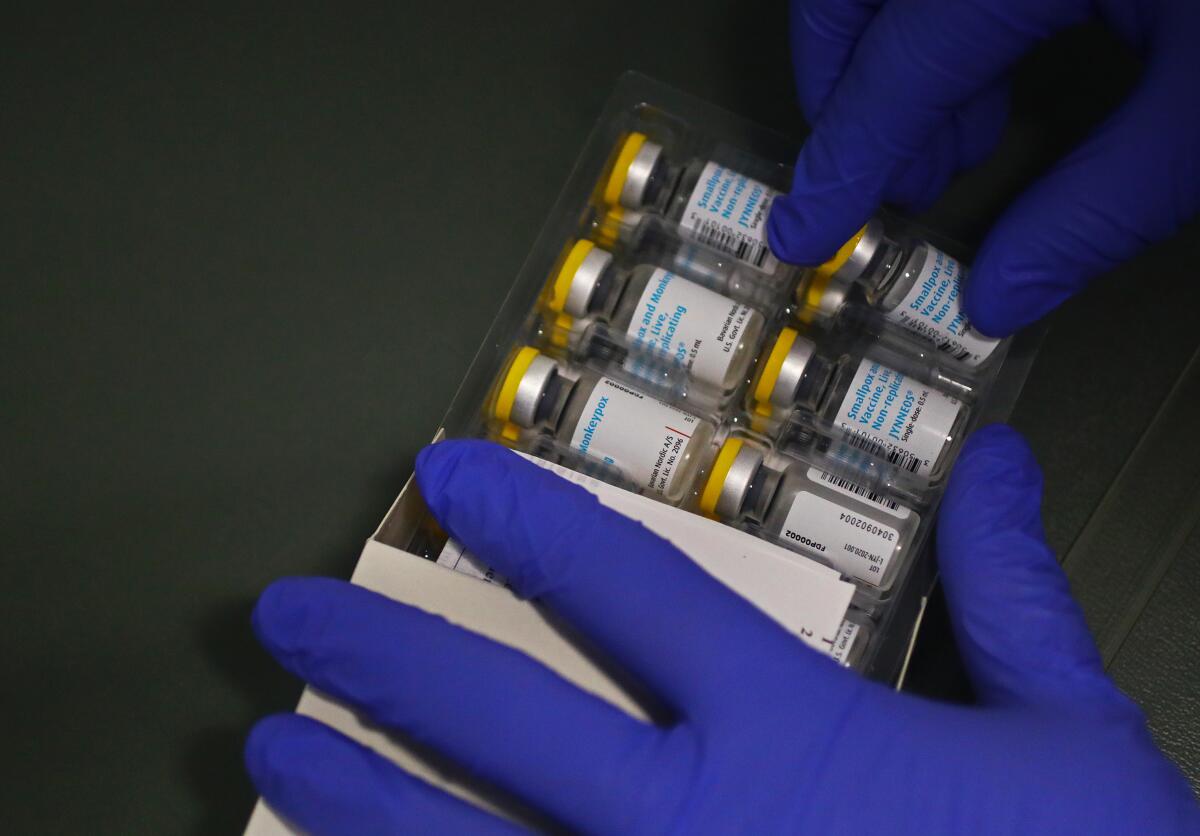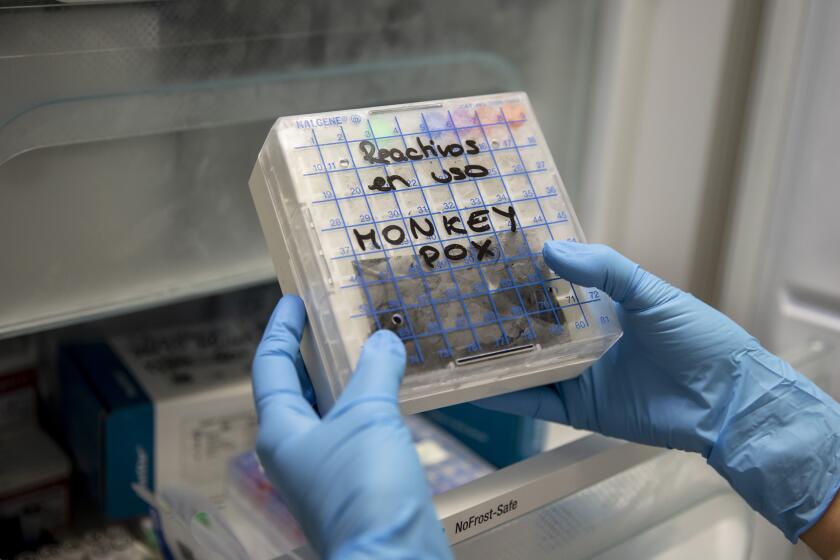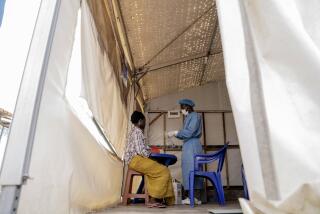Didn’t we learn anything from COVID? U.S. needs to get a move on fighting monkeypox

- Share via
In some ways, the current outbreak of monkeypox closely resembles two other public health crises of the last 40 years — COVID-19 and AIDS.
The disease was barely even known to the American public before this year, when it was limited to a few cases each year among people who traveled from Africa. Then the virus that causes monkeypox started behaving differently and was showing up in clusters around the world. Like COVID-19, monkeypox burst into our collective consciousness when it appeared in the United States in May.
In other ways, monkeypox resembles AIDS because it is transmitted through intimate contact — skin to skin or through sex. One recent study found large viral loads in semen, saliva and other bodily fluids from infected people. Like AIDS, it has so far disproportionately affected men who have sex with men, especially those with multiple partners.
Luckily, the monkeypox virus also is quite different in important ways. It is far less transmittable than the virus that causes COVID-19. You can’t be infected just by attending an indoor party with infected people. An effective vaccine — a version of smallpox vaccine — already exists and is being manufactured.
Unlike the early days of AIDS, this is not an almost invariably fatal disease. In Africa, monkeypox has killed 66 people this year. But in countries where it’s not endemic, the fatality rate has been near zero. And one other important thing: With some notable exceptions, America isn’t as homophobic as it was in the 1980s, when the Reagan administration dragged its heels responding to what many people called the “gay disease.” Men who have sex with men are being given priority access to current supplies of the vaccine.
People who work at commercial sex venues and those with diagnoses of certain sexually transmitted diseases are now eligible to get the monkeypox vaccine.
The problem is that those supplies are depressingly low and not nearly enough to cover the most at-risk groups, which also include healthcare workers, immunocompromised people and young children. Yet in May, President Biden foolishly said the nation had enough vaccine doses to combat a monkeypox outbreak here. The U.S. government does have a large supply of one type of vaccine, but it comes with so many potentially dangerous side effects that it is being distributed only in very limited situations.
In May, the U.S. government purchased 500,000 doses of a safer vaccine, made by Danish company Bavarian Nordic. This month, it ordered 2.5 million doses. But it will take months for this one company to fulfill that order. An additional order for 2.5 million doses, made a couple of weeks later, is expected to be fulfilled in early 2023. And keep in mind that this is a two-dose vaccine, which means it will protect half as many people as doses delivered.
More than 1,900 Americans have fallen ill, but the vaccine should be distributed right away to all the people who may have come in close contact, according to Centers for Disease Control and Prevention protocols. No one in the U.S. has died of the disease so far during the 2022 outbreak. With the Danish company trying to pump out enough doses to satisfy demand here and in Europe, shortages were virtually guaranteed.
Los Angeles County officials have reported limited local transmission of monkeypox, with some recent cases involving people who attended large events and infected people who haven’t traveled out of state.
Still, the federal government and state and municipal health departments could have done more to stop the initial spread of monkeypox. Authorities missed the opportunity to educate the LGBTQ community about the risks during Pride Month festivities when public health messaging was low-key or missing altogether. The number of cases rose dramatically in the couple of weeks after those events. And healthcare providers have not received the kind of information on treatment protocols from the CDC that should have been readily available.
Until more vaccine becomes available, prevention is the best way of keeping this virus from becoming a worse scourge. But that requires easy and free access to testing. Unlike with COVID-19, it’s easy to avoid transmitting monkeypox — if people know they have it. Yet the federal government used its powers to develop a more robust testing program only after vociferous criticism.
The U.S. Food and Drug Administration should consider a short-term strategy allowing high-risk people to get a single dose of the vaccine right away to stretch out the current supply, as Canada, the United Kingdom and New York City have done.
Biden’s earlier “things are fine” statement was a terrible gaffe and set an example of lax attention to monkeypox. Health officials throughout the nation now must get the lead out and show they’ve learned a thing or two from the COVID-19 pandemic.
More to Read
A cure for the common opinion
Get thought-provoking perspectives with our weekly newsletter.
You may occasionally receive promotional content from the Los Angeles Times.











